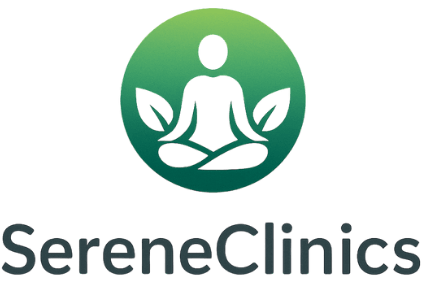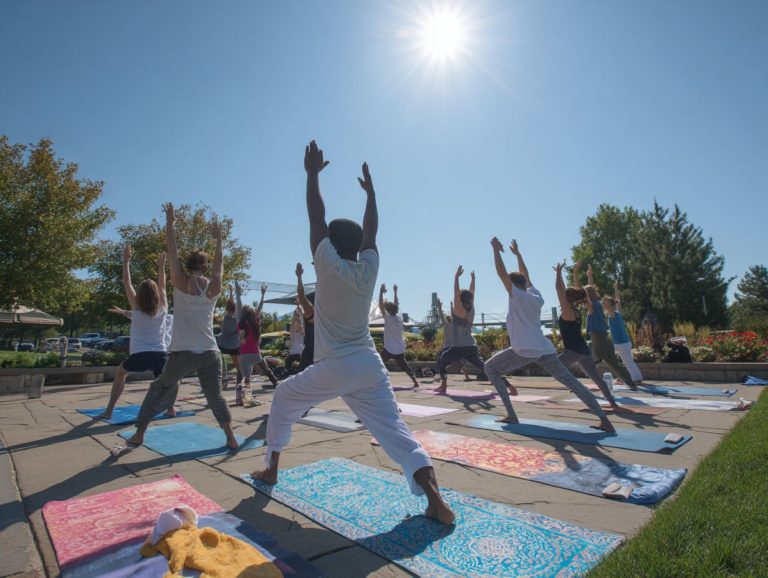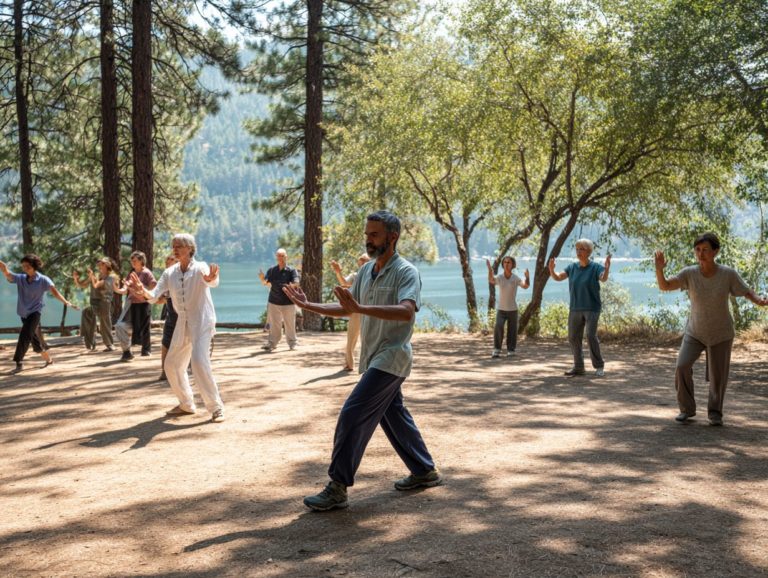How to Get Tai Chi Certification? Importance and Process
Tai Chi, an ancient practice known for its health benefits and meditative qualities, has gained popularity around the world.
For those wanting to improve their skills or teach others, getting Tai Chi certification is a crucial step.
This article explores what Tai Chi certification entails, its importance, and the many benefits it offers.
It also outlines the requirements and steps to achieve certification, as well as the different types available and how to maintain your credentials.
Whether you’re a beginner or an experienced practitioner Knowing the certification process can improve your experience in this rewarding practice.
Key Takeaways:
Contents
- 1 What Is Tai Chi Certification?
- 2 Why Is Tai Chi Certification Important?
- 3 Tai Chi Certification and Health Benefits Statistics
- 3.1 Tai Chi Certification Statistics: Effectiveness on Falls
- 3.2 Tai Chi Certification Statistics: Parkinson’s Disease Impact
- 3.3 Tai Chi Certification Statistics: Impact on Osteoarthritis
- 3.4 Tai Chi Certification Statistics: IFPA Tai Chi Instructor Certification
- 3.5 Tai Chi Certification Statistics: Effect on Chronic Conditions
- 4 What Are The Requirements For Tai Chi Certification?
- 5 What Are The Steps To Get Tai Chi Certification?
- 6 What Are The Different Types Of Tai Chi Certification?
- 7 How Can Someone Maintain Their Tai Chi Certification?
- 8 Frequently Asked Questions
- 8.1 What is Tai Chi certification and why is it important?
- 8.2 What are the benefits of getting a Tai Chi certification?
- 8.3 What is the process for getting a Tai Chi certification?
- 8.4 What are the requirements for getting a Tai Chi certification?
- 8.5 Is there a specific level of experience or skill needed to obtain a Tai Chi certification?
- 8.6 What are some reputable organizations or schools that offer Tai Chi certification?
What Is Tai Chi Certification?
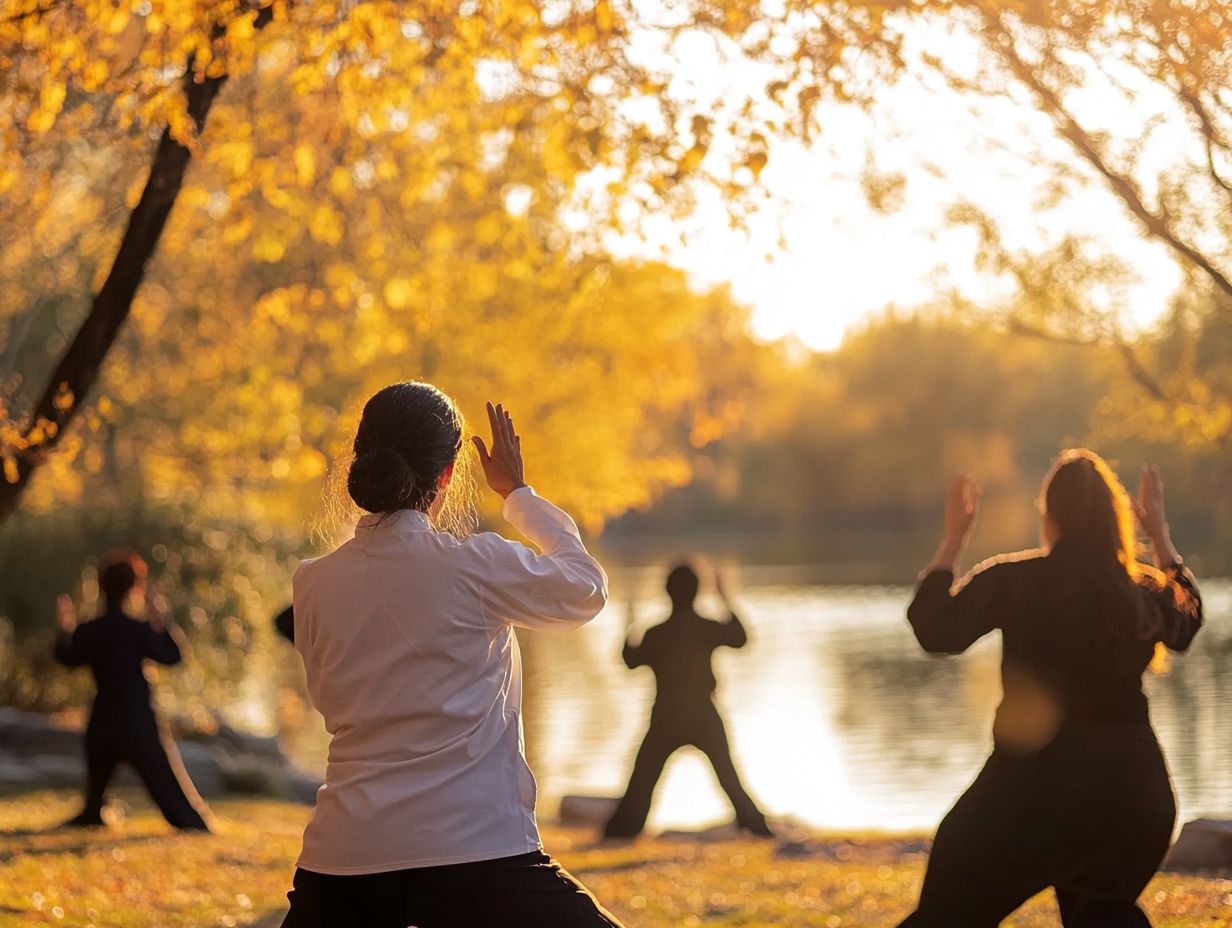
Tai Chi certification is a key credential for those who want to be known as Tai Chi teachers. Offered by respected groups like the Tai Chi for Health Institute, this program covers a detailed curriculum that includes movement meditation, teaching techniques, and practical skills. It gives instructors a strong base to teach Tai Chi well.
Certification programs usually include up-to-date methods, like video lessons and online sessions. These approaches make learning adaptable and keep instructors informed about the health advantages of Tai Chi. This helps them share the positive effects of this practice with their communities.
Why Is Tai Chi Certification Important?
Tai Chi certification is important to make sure instructors have the right skills and knowledge to teach this ancient practice correctly. Certified instructors create a safe and supportive atmosphere, promoting health benefits like better physical and mental health, along with overall wellness.
Certified Tai Chi instructors focus on the community, which helps them get better at teaching and supports community health by catering to various fitness levels and needs.
What Are The Benefits Of Getting Tai Chi Certification?
Getting Tai Chi certification provides many advantages that go beyond personal success, greatly affecting both teachers and their learners. Instructors build important abilities such as verbal cues, observation techniques, and movement skills that improve teaching effectiveness and lead to a better grasp of Tai Chi principles. For those interested in broader holistic health practices, understanding the principles of Traditional Chinese Medicine can further enhance their knowledge and approach to Tai Chi and similar disciplines.
Structured training helps them improve their teaching skills and build relationships with their students, creating chances for one-on-one guidance that makes learning better.
Students gain from better advice and structured learning paths, allowing them to study movement meditation and health practices in more detail.
Joining a group of fellow learners creates a sense of belonging and increases motivation, helping students to practice consistently and experience the various mental and physical health benefits of Tai Chi.
This method helps individuals develop personally and strengthens community connections, making learning and teaching Tai Chi enjoyable.
Tai Chi Certification and Health Benefits Statistics
Tai Chi Certification and Health Benefits Statistics
Understanding the biomechanics of Tai Chi can significantly aid in preventing falls among older adults. This practice involves a unique gait mechanism that contributes to improved stability and balance. Recent findings from ScienceDirect highlight the biomechanical benefits of Tai Chi gait (data-backed), providing valuable insights for both practitioners and researchers aiming to enhance fall prevention strategies.
Tai Chi Certification Statistics: Effectiveness on Falls
Tai Chi Certification Statistics: Parkinson’s Disease Impact
Tai Chi Certification Statistics: Impact on Osteoarthritis
Tai Chi Certification Statistics: IFPA Tai Chi Instructor Certification
Tai Chi Certification Statistics: Effect on Chronic Conditions
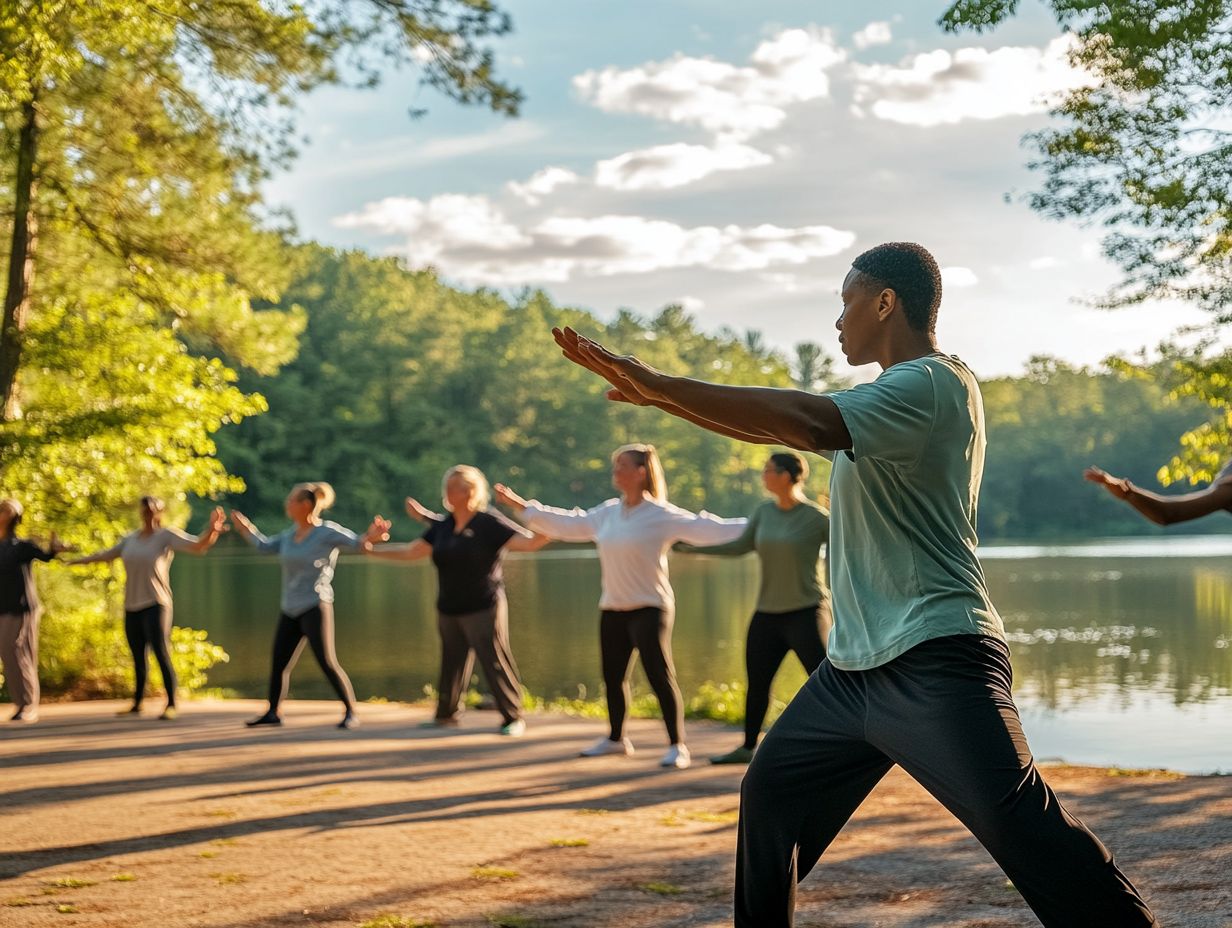
The Tai Chi Certification and Health Benefits Statistics offer a detailed summary of how Tai Chi can help improve health, especially for older people, those with Parkinson’s disease, and individuals with osteoarthritis. The data also includes information on certification and how social media affects chronic illnesses.
Tai Chi Certification Statistics indicate that Tai Chi significantly reduces fall rates. Among older adults, it achieves a 19% reduction in fall rates and a 20% reduction in the number of people experiencing falls. When combined with balance and functional exercises, fall rates decrease by 24%, while the number of individuals experiencing falls drops by 13%. This highlights Tai Chi’s potential in enhancing stability and preventing falls, particularly in older populations where fall risks are prevalent.
Regarding Parkinson’s Disease Impact, three studies reviewed involved 273 participants. Tai Chi sessions lasted 60 minutes and occurred twice weekly, over a span of 12 weeks to months. This regimen may improve motor function and balance, offering a structured approach to managing symptoms associated with Parkinson’s disease.
- Impact on Osteoarthritis involved 9 studies and 543 participants, demonstrating Tai Chi’s role in alleviating pain and enhancing mobility.
- IFPA Tai Chi Instructor Certification costs $700, with 250 certifications issued annually, reflecting growing interest in formal training and the professionalization of Tai Chi teaching.
Lastly, Tai Chi’s Effect on Chronic Conditions includes a median posting frequency of 4.7 posts per week on social platforms, alongside a 1.79% follower growth rate monthly. The influence of social media is notable with an average sponsored post costing $1300, indicating the monetary value associated with promoting Tai Chi for chronic condition management.
The benefits of Tai Chi are clear for many health issues. It helps improve physical health, lowers the risk of falls, and makes life better. The growing number of certifications issued annually indicates increasing popularity and recognition of Tai Chi’s benefits, both in personal practice and professional instruction. Social media is spreading awareness of Tai Chi, helping it become popular as an exercise that benefits chronic health issues.
What Are The Requirements For Tai Chi Certification?
To get certified in Tai Chi, candidates must fulfill specific criteria to make sure they are ready to teach this practice well.
These criteria usually include:
- Showing skill in Tai Chi movements
- Finishing a set training program
- Having the necessary instructor qualifications
Applicants might also need CPR certification to keep classes safe for students of different fitness levels. Meeting these standards helps maintain high teaching quality and improves the experience for Tai Chi learners. For those interested in exploring parallel certifications, you might appreciate our insights on the types and requirements of yoga certifications.
1. Age And Physical Ability
Age and physical ability are important factors in deciding if someone can get certified in Tai Chi. Candidates need to show basic knowledge of Tai Chi movements that match their physical skills. This makes sure that instructors can effectively adjust their teaching styles to suit students of different ages and fitness levels.
By knowing these points, those who want to become instructors can get ready for the certification process.
Teachers need to understand that their students have different levels of movement and fitness, so it’s important to make a flexible plan.
It’s important for them to integrate modifications and alternative movements that cater to individuals who may be older or face physical limitations. Good teachers can create a welcoming space by allowing students to learn at their own speed and supporting their physical comfort and focus.
Using tools such as chairs for support or gentle stretching routines can greatly improve learning, allowing everyone to benefit from the practice, regardless of their current level.
2. Knowledge And Experience
A solid foundation of knowledge and experience in Tai Chi is essential for candidates pursuing certification, as it equips them with the necessary skills to teach effectively. This covers learning Tai Chi principles, movements, and teaching methods that help students from different backgrounds learn effectively. Candidates are often encouraged to join a full training program that improves their skills and readies them for the hands-on parts of teaching.
Aspiring instructors in structured training programs learn the details of Tai Chi forms and techniques. They also build important communication skills needed to interact well with others.
These programs often include practical experiences, allowing participants to teach real students, which helps them learn about different ways students learn.
Mentorship is important in this process, where experienced instructors share helpful advice and feedback, helping newcomers improve their teaching methods.
Such guidance builds the confidence and flexibility needed to make a positive and engaging learning space for all practitioners.
3. CPR Certification
CPR certification is often a mandatory requirement for Tai Chi certification, emphasizing the importance of safety alignment in instructor qualifications. This training teaches instructors how to manage emergencies properly, ensuring classes are safe for students. Obtaining CPR certification helps upcoming Tai Chi instructors strengthen their qualifications and demonstrate to students that their safety matters, as detailed by NYC Health.
Having certified instructors helps create a supportive environment, reassuring participants that their instructor can handle any situation.
This knowledge helps reduce any anxiety or hesitation that students might feel, allowing them to fully engage in the practice.
When instructors become CPR certified, they increase their trustworthiness and make the learning environment safer and more engaging. This helps participants concentrate on learning Tai Chi without concern.
What Are The Steps To Get Tai Chi Certification?
To get a Tai Chi certification, you need to complete several key steps to get ready for teaching.
- First, find a certified Tai Chi instructor who can lead you.
- Then, enroll in a structured training program that covers necessary lessons and methods.
- After completing the training, you need to pass a written test and a practical test to evaluate your knowledge and teaching abilities before receiving your certification.
1. Find A Certified Tai Chi Instructor
The first step in obtaining Tai Chi certification is to find a certified Tai Chi instructor who can provide guidance and mentorship throughout the training process. This relationship matters because a knowledgeable instructor will show the basic Tai Chi movements and offer helpful details on teaching methods and the ideas behind Tai Chi practice. A solid mentor relationship can greatly improve a candidate’s learning and get them ready for certification.
- Look for certified instructors by checking local Tai Chi schools, community centers, or trustworthy online platforms that highlight qualified teachers.
A good mentor should know Tai Chi techniques well, be patient, empathetic, and create a welcoming learning environment.
A knowledgeable teacher gives helpful advice on handling problems and learning the basic parts of Tai Chi. Their experiences can inspire and help candidates find their own way to certification, building their confidence in their skills.
2. Complete A Tai Chi Training Program
Finishing a Tai Chi training program is important for anyone wanting certification because it gives the necessary knowledge and movement skills needed to teach well. Such programs often emphasize experiential learning, allowing candidates to practice leading classes and develop their personal teaching methods.
Joining hands-on tasks during the training allows instructors to address the various needs of their students and makes their teaching better overall.
In a usual training program, participants practice different Tai Chi forms, focusing on smooth and exact movements. Instruction usually covers both the physical movements and the philosophical elements, giving the instructor a better grasp of Tai Chi as a complete practice.
Candidates regularly receive feedback, which helps them improve their methods and ways of teaching. Every element is important for developing confidence and ability, ensuring that new instructors are prepared to lead their students through the difficulties of Tai Chi practice effectively.
3. Pass A Written Exam

Passing a written exam is a critical requirement in the Tai Chi certification process, as it assesses candidates’ knowledge of Tai Chi principles, teaching methodologies, and safety protocols. This test checks if candidates understand essential concepts and confirms they are prepared to provide effective teaching. A strong performance on the written exam is indicative of a candidate’s preparation and readiness to teach Tai Chi effectively.
The written exam typically includes a diverse array of question types, such as multiple-choice, short answer, and scenario-based inquiries. These questions check how much a candidate knows about basic Tai Chi concepts, including the principles and how the movements are applied.
They might evaluate teaching readiness by asking candidates to draft lesson plans or manage common classroom scenarios, ensuring they can build a supportive learning environment. This exam tests both knowledge and practical skills. It is an important measure for assessing a candidate’s qualifications and ability to teach Tai Chi.
4. Pass A Practical Exam
To complete the Tai Chi certification process, candidates must also pass a practical exam that evaluates their teaching skills and ability to lead a Tai Chi class effectively. This hands-on assessment allows candidates to demonstrate their movement skills, verbal cueing, and student support techniques in a real-world setting. Passing the practical exam proves a candidate is prepared to teach and knows how to set up a welcoming classroom atmosphere.
During the practical exam, evaluators will look for clear instructions, the ability to change techniques for different skill levels, and good communication with students.
Candidates should prepare by practicing their routines, refining their explanations, and participating in mock teaching sessions to build confidence. Familiarizing oneself with common questions and challenges that may arise during a session can also be beneficial.
After the evaluation, you will get helpful feedback that can improve your teaching style and help you become a better Tai Chi teacher.
5. Receive Certification
Once candidates successfully complete all the necessary steps, they are awarded their Tai Chi certification, marking their official recognition as a qualified instructor. This certification shows their commitment to teaching Tai Chi and their knowledge of its health benefits, providing a foundation for a successful career in encouraging wellness and better health in their communities. Certified instructors can now confidently lead classes and share their knowledge with others.
Getting good at this skill makes their work better and helps them motivate and impact their students’ lives.
The certification allows you to access many opportunities, such as leading workshops, creating focused programs, and working with health organizations.
For instructors, possessing recognized teaching qualifications is paramount as it establishes credibility and a sense of trust with potential learners.
Their positive influence can lead to increased appreciation for overall health practices, encouraging more people to participate in Tai Chi and enjoy its many benefits.
What Are The Different Types Of Tai Chi Certification?
There are various Tai Chi certifications aimed at different skill and teaching levels.
The first level is the instructor certification, which provides the basic skills needed to lead Tai Chi classes.
For those wanting to improve their teaching skills, there is a higher-level instructor certification.
The master instructor certification is for experienced practitioners who aim to teach other instructors and help the Tai Chi community.
1. Instructor Certification
Instructor certification is the foundational certification for individuals aspiring to teach Tai Chi, focusing on core techniques and basic teaching methodologies. This certification guarantees that instructors have the skills needed to teach classes successfully and offer students a complete Tai Chi experience. Candidates typically complete a designated training program covering essential movements, safety alignment, and effective class management.
The curriculum includes essential knowledge areas such as the philosophy behind Tai Chi, its historical context, and the various styles that characterize this ancient art.
Instructors learn how to perform poses correctly and teach the basics of breathing techniques and concentration, which are important for developing a complete practice.
With this certification, individuals can start their teaching career with confidence, ready to take on the duties of leading students in Tai Chi, creating an environment that supports their physical and mental health.
2. Advanced Instructor Certification
Advanced instructor certification is for those who already have basic instructor certification and want to improve their skills. This certification focuses on advanced teaching techniques, improving movement skills, and studying specific parts of Tai Chi practice. Participants take part in thorough training, getting ready to teach advanced styles and adjust their classes for different student needs.
Apart from practical skills, the certification process stresses a deep knowledge of Tai Chi philosophy and its health benefits. This allows instructors to offer a complete experience for their students. In fact, The New York Times highlights that Tai Chi is not only beneficial for physical fitness but also serves as a workout for the brain, enhancing the holistic approach instructors can provide.
Instructors can focus on specific areas like Tai Chi for recovery, self-defense methods, or meditation practices, expanding their knowledge.
Getting advanced certification increases the instructor’s confidence and trust, while also improving the students’ learning experience.
By committing to ongoing education, instructors create a positive environment, showing the importance of continuous learning and professional growth in the changing area of Tai Chi teaching.
3. Master Instructor Certification
The master instructor certification is the highest level for Tai Chi teachers, intended for those with extensive experience and full knowledge. This certification allows instructors to teach others and run certification programs, sharing their deep knowledge of Tai Chi and its health benefits. Experienced instructors are important in developing the next group of Tai Chi teachers.
Getting this certification takes a lot of effort. It includes thorough training, a deep knowledge of Tai Chi principles, and skill in advanced moves.
Once certified, these instructors assume significant responsibilities, including curriculum development, quality assurance in teaching, and providing ongoing support to their students.
Their impact reaches far beyond their own group. By teaching knowledgeable mentors, they make sure Tai Chi’s values and methods are maintained, and its moves and ideas are taught correctly.
The connections made through mentorship improve personal skills and make the whole Tai Chi community stronger, resulting in a more fulfilling and lively practice for all participants.
How Can Someone Maintain Their Tai Chi Certification?
Tai Chi instructors need to keep their certification to stay informed about the newest teaching methods, health advantages, and safety guidelines. This usually involves attending continuing education classes that offer new information on Tai Chi practice, supporting personal development and career advancement.
Instructors also need to follow a renewal process, which might require teaching a specific number of classes and completing certain training hours to maintain their credentials.
1. Continuing Education

Ongoing learning is important for keeping a Tai Chi certification current because it helps instructors stay updated on the newest Tai Chi techniques and teaching methods. Many organizations offer specialized training programs and workshops that focus on advanced techniques, health benefits, and innovative teaching methods. By joining these programs, teachers can improve their abilities and offer a more engaging learning experience for their students.
Besides attending workshops and seminars in person, instructors can now take online courses. This offers them useful materials without needing to worry about travel or scheduling.
These online platforms often include video guides, teaching webinars, and interactive forums that create a community feeling for practitioners.
As instructors continue to improve their skills, they make their teaching methods better and learn new ways to connect with students and develop personally.
This ongoing focus on learning leads to improved teaching and a closer connection with students, creating a more interesting classroom for all involved.
2. Renewal Process
The renewal process is essential for Tai Chi instructors to maintain their certification, ensuring that their teaching qualifications remain valid and up to date.
To renew, instructors must gather and submit various documents. These include proof of workshops they have finished, records of their teaching hours, and possibly statements from students or colleagues showing their continued involvement in the Tai Chi community.
This step shows their commitment to personal growth and improves their reputation as teachers. Joining local or national Tai Chi gatherings can offer opportunities to connect with others, allowing instructors to exchange ideas, techniques, and experiences.
Such interactions improve their teaching and highlight the importance of lifelong learning, benefiting their students and raising the standards of Tai Chi instruction.
3. Teaching And Practicing Tai Chi Regularly
Teaching and practicing Tai Chi often is important for maintaining certification. It helps an instructor maintain their skills and improves their teaching. Teaching classes allows instructors to make their methods better, notice details more easily, and give students more effective help. This ongoing practice helps teachers in their careers and creates an active learning space for students.
By improving their skills, instructors learn about the specific difficulties their students encounter, allowing them to change their teaching approach more successfully.
Meeting often with different groups changes normal sessions into opportunities for better communication and customized teaching, improving the experience.
Teachers who regularly improve their skills can raise the quality of Tai Chi practice in their communities, leading to increased commitment and interest among their students.
This commitment to practical teaching keeps Tai Chi genuine and helps maintain an active group dedicated to its principles.
Frequently Asked Questions
What is Tai Chi certification and why is it important?
Tai Chi certification is a recognition of an individual’s proficiency in the practice of Tai Chi. It’s important because it shows skill and knowledge in the field, and can lead to learning and development.
What are the benefits of getting a Tai Chi certification?
Getting certified in Tai Chi can offer advantages like better health, more knowledge of the practice, and the chance to work as a Tai Chi teacher.
What is the process for getting a Tai Chi certification?
The process for obtaining a Tai Chi certification may vary depending on the organization or school providing the certification. Generally, it involves completing training and coursework, demonstrating proficiency in Tai Chi techniques and principles, and passing a final exam or evaluation.
What are the requirements for getting a Tai Chi certification?
The requirements for obtaining a Tai Chi certification may differ depending on the certifying organization or school. Some common requirements may include completing a certain number of hours of training and practice, demonstrating knowledge of Tai Chi principles and techniques, and passing a final exam or evaluation.
Is there a specific level of experience or skill needed to obtain a Tai Chi certification?
No, there is no specific level of experience or skill required to obtain a Tai Chi certification. It is suggested that people should know the basics and have practiced Tai Chi before getting certified.
What are some reputable organizations or schools that offer Tai Chi certification?
Some well-known and reputable organizations or schools that offer Tai Chi certification include the Tai Chi Association, the International Yang Family Tai Chi Chuan Association, and the American Tai Chi and Qigong Association.

Sheetal Sharda has a background in CS. She got an interest in Holistic living back in 2018, and has since started exploring more into Naturapathy, Holistic Living, Yoga, and more. She got inspired to start SereneClinics to help people find reliable centers across the world.
